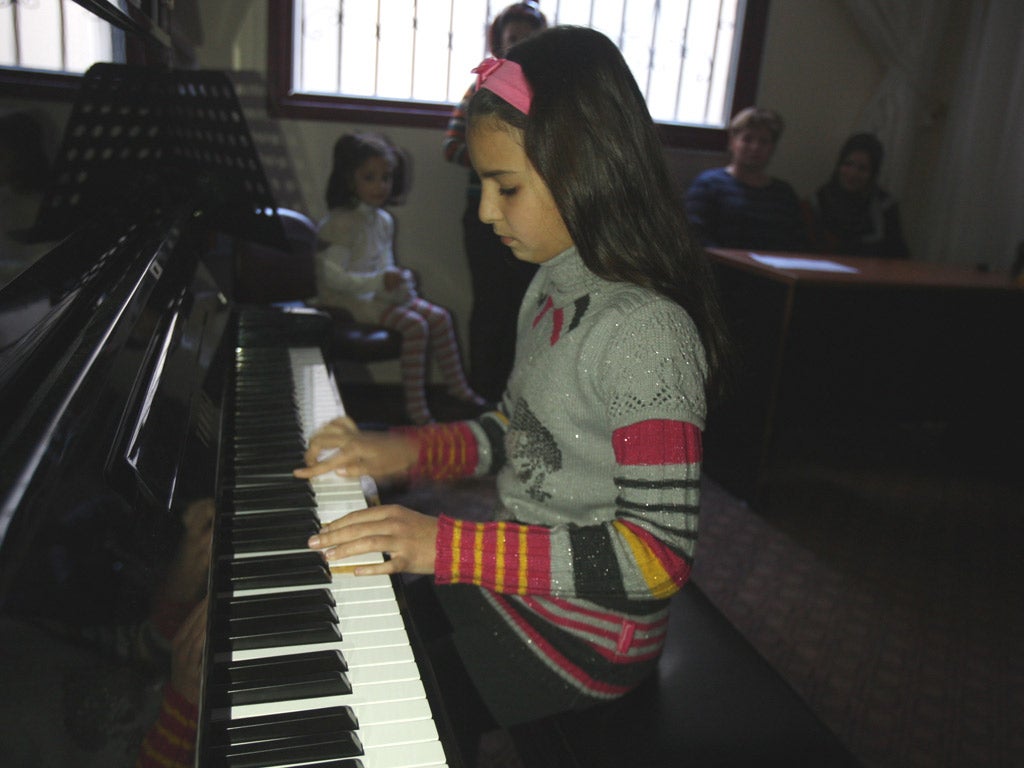The children finding peace in the beauty of music in war-torn Gaza

It's late afternoon and in a room darkening due to an all-too-familiar power cut, Shaden Shabwan, 10, plays a Czech folk tune on a Yamaha piano as her teacher wills her to avoid mistakes.
It's test day for piano students at Gaza Music School, where Shaden is in her second year. Across the corridor is classmate Abdel Aziz Sharek, also 10. Accompanied on ouds and tabla, he picks out a mesmerising classical longa on the qanun, the zither-like instrument central to Arab music. Abdel Aziz takes his studies as seriously as he does music. "I want to be a doctor," he explains. "But I will keep playing. I will be in a band at the same time."
In the piano room, Sara Akel plays two études by Austrian composer Carl Czerny and a Bach Polonaise, with such confidence you would never guess she was 12. Sara prefers music to academic subjects. "I'm really looking to be a professional musician," she says. In Gaza? "Why not?"
It's a fair question. This centre of artistic excellence may conflict with Gaza's popular image. But it is nurturing a young musical generation worthy of its peers elsewhere. The 52 boys and 73 girls come three times a week after school. While many have never touched a musical instrument before, they pass tests of ear and rhythm to get in.
Among several Gaza prizewinners who performed for the judges in the last national Palestinian music competition by video link – as students cannot leave the territory – seven-year-old qanun player Mahmoud Khail was first in his age group. This April the school will become the fifth full branch of the Edward Said National Music Conservatory – the Palestinian music institution named after the nationalist writer and music lover who died in 2003.
But the school is also a powerful symbol of Gaza's resilience. It was founded three years ago with finance from the Qattan foundation and the Swedish government. The first students gave their first concert in December, 2008.
Four days later, during Israel's attack on Hamas-controlled Gaza a direct hit landed on the Preventative Security HQ and damaged nearby buildings including the school. Director Ibrahim Najar, a music graduate from Cairo University and qanun maestro, was in the building. He suffered only cuts and bruises
But on 14 January, Israeli soldiers entered Tel el Hawa. The PRCS building was hit, and the school and several of its instruments, including the precious piano, destroyed. Thanks to the American NGO Anera, replacements were brought across the border despite the Israeli-imposed blockade, including two new pianos. Although tuition is free, many pupils are middle-class – with professional or academic parents. But the school's scholarship programme ensures talented pupils are not excluded by poverty.
Musically speaking, Edward Said's name is best known for the West-Eastern Divan orchestra he formed with Palestinian and Israeli musicians in 1999 with conductor Daniel Barenboim. But the Conservatory that bears his name doesn't work with the orchestra, believing in a cultural boycott of Israel until the occupation ends. Conservatory director, Suhail Khoury, asks: "What is this orchestra telling the world – that Palestinian and Israelis can play together? We know that."
The stance did not stop the Conservatory-run Palestine National Orchestra playing an inaugural concert in the mixed Israeli city of Haifa last year. The target audience was Israeli Arab but Jews – and Israeli TV – were welcome. Mr Khoury had declared: "Today an orchestra, tomorrow a state." After all, Israel's birth in 1948 was 12 years after formation of the orchestra which became the Israel Philharmonic.
Back in the Gaza Music School, 20 or so young voices resonate from a lecture room. Café owner's son Feras Adas, 9, explains how he started to play a cousin's guitar.
"I learned from him but I made lots of mistakes before. Now I want to be a big musician in guitar." Asked if, with talk of a fresh Israeli invasion, he fears the music school could be bombarded, he has his own take on the power of music to transcend borders and battle lines. "I think it will not be hit," he says. "The Jews like this kind of thing."
Subscribe to Independent Premium to bookmark this article
Want to bookmark your favourite articles and stories to read or reference later? Start your Independent Premium subscription today.

Join our commenting forum
Join thought-provoking conversations, follow other Independent readers and see their replies